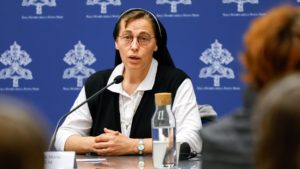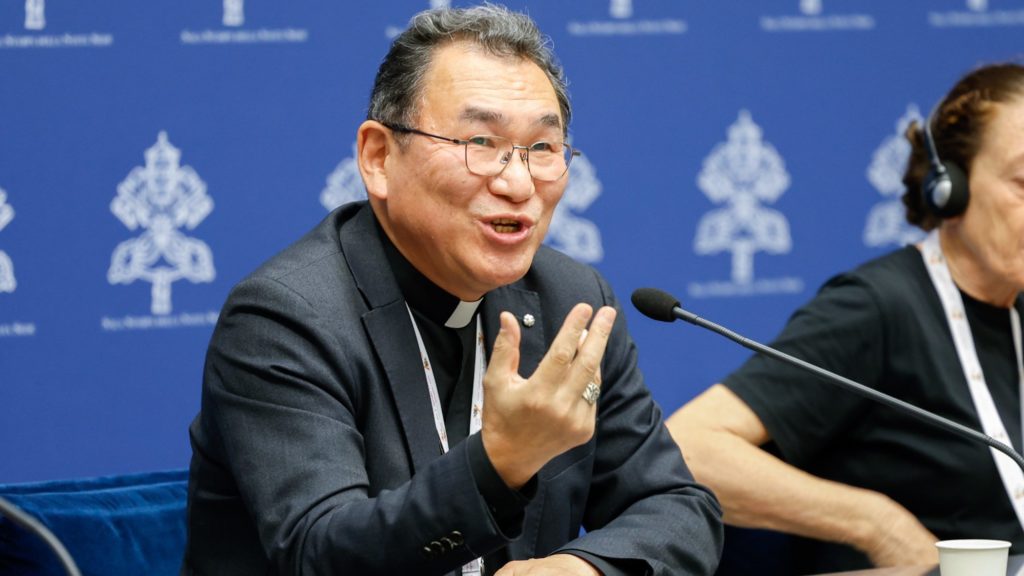The synodal process does not stop at listening but should lead to incorporating what was discussed at the Synod on Synodality into the life of the Catholic Church, said many of the members participating in the synod.
"Everything will depend on us returning to our dioceses and putting in practice what we are saying here, (about) what the church should be," Cardinal Carlos Aguiar Retes of Mexico City said at a Vatican press briefing Oct. 23. "If we only stay at listening and don't apply our responsibilities to our daily life, well, nothing happens."
Speaking of his experience in Mexico City, Cardinal Aguiar said that since 2021, half of the 416 parishes in his archdiocese implemented parish assemblies for all members of the parish to speak together in a "methodology of consensus, of reciprocal listening, dialogue."
"They told us bishops what they need to live their faith and transmit it to others," he said.
By living synodality, "I am convinced that it is the way of the church," he said. "If we do it, we will transmit the faith; if we don't do it, we will turn into small groups of Catholics" as is happening in some places in the world, the cardinal added.
Synod participants entered the final week of the assembly Oct. 23, discussing a "Letter to the People of God" and the assembly's synthesis document.
Discussing outcomes of the synod of synodality, Cardinal Christoph Schönborn of Vienna said that "if an increase in faith, hope and charity does not come out of this experience, everything is in vain."
Right now, "communion is essential for the church" especially as it becomes increasingly based outside of Europe, he said, adding that synodality "is the way of living communion."
The cardinal, a veteran of synods, said that this assembly's methodology was the best by far since it helps members listen to one another.
He said he had told Jeffrey Sachs, the economist and public policy analyst, about the methodology used for this Synod of Bishops, marked by long bouts of silence, reflection and prayer.
"If only the U.N. Security Council used this method, maybe we would have a bit more peace in the world," he recalled Sachs saying in response. There, Cardinal Schönborn said, each representative "has the directives of their government, each one says their position and then there is no exchange."
Sister Samuela Maria Rigon, superior general of the Sisters of the Sorrowful Mother, said that listening is an essential aspect of the synod's methodology which must also be applied outside the Vatican walls.
"Maybe we all need this, in families, in workplaces, in religious communities, in ecclesial assemblies," she said. "In the synod, we have truly experienced this."

Synod members will soon face the challenge of bringing back to their home dioceses, regions and continents the synodal way of inviting others, listening and discerning together that they are experiencing at the synod, two archbishops said.
"We all, as people, get into our habits and our ruts and you have to very consciously say, 'We're going to do things differently now,'" Archbishop Gintaras Grušas of Vilnius, Lithuania, said at a synod briefing Oct. 20.
"With yourself, you can do it. When you try to bring a whole diocese or a whole nation or a whole continent with you, it takes a lot more work," said the archbishop, who is also president of the Council of European Bishops' Conferences.
"Being here for a month and really living the spiritual conversations, having them and valuing them," he said, challenges members to try to bring that experience "into the same structure from which we came with all the same daily grinds that we have." However, "I'm looking forward to it."
Archbishop Tarcisio Isao Kikuchi of Tokyo said the challenge in Japan is an ongoing lack of in-person activities as a consequence of the pandemic. "The people are still afraid, especially the elderly people are afraid, so we don't have much opportunity to gather the people together to do this synodal process together."
Also, "Asian countries are really quite clerical; still the clerics decide," he said, and "I think we have to involve many more laity in the decision-making of the church."
The challenge there is "we have to be serious" about how to involve lay men and women who are already short on time with very busy lives and families to take care of, the archbishop said.
The archbishop, who also is secretary-general of the Federation of Asian Bishops' Conferences, said he also wants to work more on introducing into church life the Asian spirit of hospitality as expressed in the Asian continental report to the synod.
Their culture of welcome asks that people take off their shoes "and be free from daily life, be free from the daily worries, (and then) enter your house," he said. "It is true that our structure is really Western structure, of course, the Catholic Church," he said, but it is possible to "introduce our hospitality spirit into the parish activities."
"First welcome all the people," he said, to "take off your shoes, come in, don't stand outside, but come into my house and let's talk about your life."
Sister Mary T. Barron, superior of the Sisters of Our Lady of the Apostles and president of the International Union of Superiors General, told reporters, "We need to listen more to the emerging churches, the younger churches, who still have that kind of grassroots participation in the life of the church."
She compared her experience coming from Ireland where Christianity has existed since the fifth century and her missionary work in East Africa. One parish there, she said, was established in 1950 and had only two priests for an area nearly half the size of Ireland.
It was a "very vibrant faith community," she said, and her role of accompanying young people and women's groups in the parish was a synodal process. "We listened to each other, the decisions were taken together," which then radiated out to the wider parish and "fed into the diocese."
"I think possibly one of the advantages in the younger churches is that many people come to the faith as adults and make that choice to be baptized as adults, and are confirmed into a faith where they are challenged to be missionary disciples from the outset," she said.

